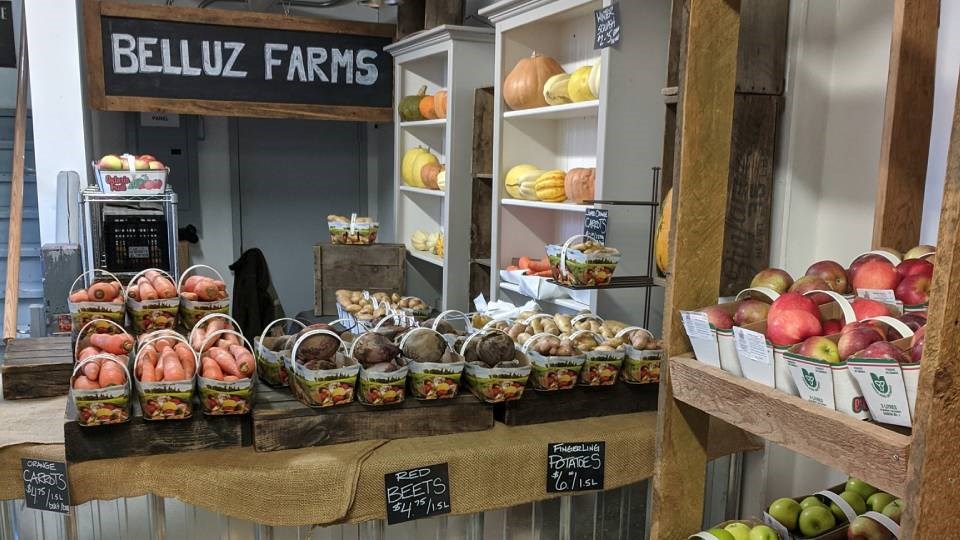By the time the pandemic was declared last March, Superior Seasons was already a decade into operation. Yet, the virtual farmers market, featuring local vendors and run out of the Slate River Valley in northwestern Ontario, was at a bit of a standstill.
“In January of last year, we essentially closed the site down,” explained Kevin Belluz, a third-generation farmer at Belluz Farms who also runs the market.
“We had never got enough traction, either from customers or, frankly, from our other local farms and businesses and food providers.”
Belluz was on the verge of shelving the site for good when COVID arrived and demand suddenly skyrocketed.
During the week of March 16, the site fielded 225 orders, up from just three the week before.
Three weeks later, that number had jumped again, to 425 individual orders in a week.
In just one month’s time, the market experienced an increase in sales of 1,362 per cent.
Activity became so frenzied, Belluz said, he had to temporarily shut down the site on multiple occasions because he wasn’t sure it could handle the increased capacity.
“It was definitely challenging, and it was at a time when we were having to hire people and bring more people to our farm and business, at a time when we didn’t know what was happening with the virus,” Belluz said.
“So you’re taking those risks on, basically, in order to try and meet that demand and serve the customers.”
Adapting during the pandemic to make local food more accessible was the focus of a March 24 presentation as part of the North & Eastern Ontario Local Food Conference.
The month-long online event is being jointly hosted by the Northern Ontario Farm Innovation Alliance (NOFIA), the County of Renfrew, and the Ontario Ministry of Agriculture, Food and Rural Affairs.
Want to read more stories about business in the North? Subscribe to our newsletter.
Working in the market’s favour, Belluz said, was the long-established brand identity associated with both the market and Belluz Farms.
In operation since 1946, the farm produces fruits and vegetables, which are sold at an on-farm market, through a community shared agriculture (CSA) structure, local farmers markets, as well as to local restaurants and small grocery businesses.
It also offers on-farm experiences, such as workshops, educational farm tours, and an autumn event that includes a corn maze, a pumpkin hunt, and wagon rides.
“We were fortunate, having been around in the marketplace for a long time, Belluz Farms itself and our online store had an existing presence and level of respect and authenticity in the marketplace,” Belluz said.
“So when COVID happened, we were well poised and fortunate to be in a place to be able to advance sales quickly.”
With coolers, freezers and other infrastructure already on hand, the farm could easily unload vendors’ products, repack them into individual orders, and have them ready for delivery the next day, Belluz said.
The farm already had two delivery trucks, and by bringing on just a few more people, the market was able to meet demand after an adjustment period, he added.
Belluz said the biggest problem, faced by them and other producers, was running out of product – no one could have predicted a pandemic-induced spike in the interest in local food.
“Things sold out a lot,” he said.
Now, Superior Seasons is working with more than 125 local producers, more than half of whom are from Thunder Bay.
Belluz supplements local products with items from 100KM Foods, a Toronto-based business that sources products from Ontario-based producers.
That’s helpful when the market runs out of local items or wants to bring in something that can’t be grown in northwestern Ontario, Belluz said.
He noted that, before COVID, statistics showed that fewer people were cooking at home, and a larger percentage of many household food budgets was going toward prepared foods and restaurants.
If producers want to maintain the momentum behind local food post-pandemic, he believes it will require a reevaluation of how we approach food, on the part of both producers and consumers.
More education on food systems seems to be an especially important component to that, like learning to eat foods that are available according to the season instead of expecting to get any fruit or vegetable 12 months of the year.
“It’s really important to recognize that some of the strategies we’d all been using in the local food business up until COVID really hadn’t gained a lot of market traction for, especially, medium-scale producers,” Belluz said.
“It’s going to be great… if we can keep that momentum rolling and really change how we think about things and don’t just go back to strategies we were maybe using before.”
The final installment of the North & Eastern Ontario Local Food Conference will take place on March 31.




